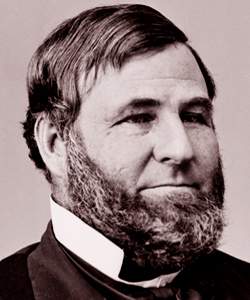David Davis (Congressional Biographical Directory)
Reference
DAVIS, David, (cousin of Henry Winter Davis), a Senator from Illinois; born near Cecilton, Cecil County, Md., March 9, 1815; attended the public schools of Maryland; graduated from Kenyon College, Ohio, in 1832; studied law in Lenox, Mass., and at the law school in New Haven; admitted to the bar in 1835 and commenced practice in Pekin, Tazewell County, Ill.; moved to Bloomington, Ill., in 1836, and continued the practice of law; member, State house of representatives 1844; delegate to the State constitutional convention in 1847; judge of the eighth judicial circuit of Illinois 1848-1862; appointed by President Abraham Lincoln as an Associate Justice of the Supreme Court of the United States 1862-1877, when he resigned to become a Senator; candidate for nomination for president on the Liberal-Republican ticket in 1872; elected as an Independent to the United States Senate, and served from March 4, 1877, until March 3, 1883; was not a candidate for renomination in 1882; served as President pro tempore of the Senate during the Forty-seventh Congress; retired from public life; died in Bloomington, McLean County, Ill., June 26, 1886; interment in Evergreen Cemetery.
“Davis, David,” Biographical Directory of the United States Congress, 1774 to Present, http://bioguide.congress.gov/scripts/biodisplay.pl?index=D000097.
David Davis (American National Biography)
Scholarship
During his fourteen-year tenure on the [Supreme] Court Davis participated in several notable decisions. That for which he is best remembered is the Court's 1866 ruling in Ex parte Milligan. In September 1862, President Lincoln had issued a proclamation suspending the writ of habeas corpus for civilian prisoners in the North under military authority. Such persons could be arrested for resisting the draft, obstructing volunteers, or other acts of disloyalty. Moreover, such individuals could be tried and punished by courts-martial or military commission. Lambdin P. Milligan, leader of the Sons of Liberty, an Indiana Copperhead group opposed to the war, was tried and convicted by a military commission based on the proclamation. Overturning Milligan's conviction, Davis held that Lincoln's suspension of the writ of habeas corpus had been an unconstitutional usurpation of congressional authority and that the president had no authority to authorize the use of military courts except in case of controlling necessity. Although Davis received harsh criticism from Republicans for this decision, he believed it an important statement of civil liberties protection.
Robert M. Goldman, "Davis, David," American National Biography Online, February 2000, http://www.anb.org/articles/11/11-00219.html.




